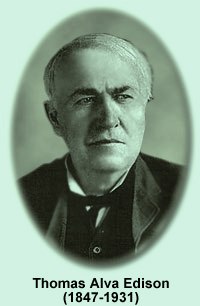
The Edison Gene
Author Thom Hartmann has written about what he believes is a genetic difference that exists among certain individuals due to its survival advantage for our primitive hunter ancestors. He refers to this in modern man as the Edison Gene, after Thomas Alva Edison. Hartmann writes:
When Edison’s schoolteacher threw him out of school in the third grade for being inattentive, fidgety, and "slow," his mother, Nancy Edison, the well—educated daughter of a Presbyterian minister, was deeply offended by the schoolmaster’s characterization of her son. As a result, she pulled him out of the school. She became his teacher from then until the day he went off on his own to work for the railroads (inventing, in his first months of employment, a railroad timing and signaling device that was used for nearly a century). She believed in him and wasn’t going to let the school thrash out of him his own belief in himself. As a result of that one mother’s efforts, the world is a very different place.
"Ah, but we mustn’t coddle these children!" some say. Consider this: Edison invented, at age sixteen, that device that revolutionized telegraph communication. It started him on a lifelong career of invention that led to the light bulb, the microphone, the motion picture, and the electrification of our cities. Would the world have been better off if he’d been disciplined into "behaving himself"?
The children and adults who carry this gene have and offer multiple gifts, both individually and as members of our society. Sometimes these gifts are unrecognized, misinterpreted, or even punished, and as a result, these exceptional children end up vilified, drugged, or shunted into Special Education. The result is that they often become reactive: sullen, angry, defiant, oppositional, and, in extreme cases, suicidal. Some Edison—gene adults face the same issues, carrying the wounds of school with them into adulthood, often finding themselves in jobs better adapted to stability than creativity.
What exactly defines those bearing this genetic makeup? Edison- gene children and adults are by nature:
Enthusiastic
Creative
Disorganized
Non—linear in their thinking (they leap to new conclusions or observations)
Innovative
Easily distracted (or, to put it differently, easily attracted to new stimuli)
Capable of extraordinary hyperfocus
Understanding of what it means to be an "outsider"
Determined
Eccentric
Easily bored
Impulsive
Entrepreneurial
Energetic
All of these qualities lead them to be natural:
Explorers
Inventors
Discoverers
Leaders .
Those carrying this gene, however, often find themselves in environments where they’re coerced, threatened, or shoehorned into a classroom or job that doesn’t fit. When aren’t recognized for their gifts but instead are told that they’re disordered, broken, or failures, a great emotional and spiritual wounding occurs. This wounding can bring about all sorts of problems for children, for the adults they grow into, and for our society.
I and many scientists, educators, physicians, and therapists believe that when these unique children don’t succeed in public schools, it’s often because of a disconnect between them—their brains are wired to make them brilliant inventors and entrepreneurs—and our schools, which are set up for children whose brains are wired to make them good workers in the structured environments of a factory or office cubicle.
Those children whom we call "normal" are more methodical, careful, and detail-oriented and are less likely to take risks. They often find it hard to keep it together and perform in the rapid-fire world of the Edison—gene child: They don’t do as well with video games, couldn’t handle working in an emergency room or on an ambulance crew, and seldom find themselves among the ranks of entrepreneurs, explorers, and salespeople. Similarly, Edison—gene children have their own strengths and limitations: They don`t do well in the school environment of repetition, auditory learning, and rote memorization that has been set up for "normal" kids, and they don’t make very good bookkeepers or managers. Genetically these kids are pioneers, explorers, and adventurers. They make great innovators, and they find high levels of success in any field where there’s a lot of change, constant challenge, and lots of activity. Such personalities are common among emergency room physicians, surgeons, fighter pilots, and salespeople.
There are many areas in which such people can excel—especially when they make it through childhood with their belief in themselves intact.